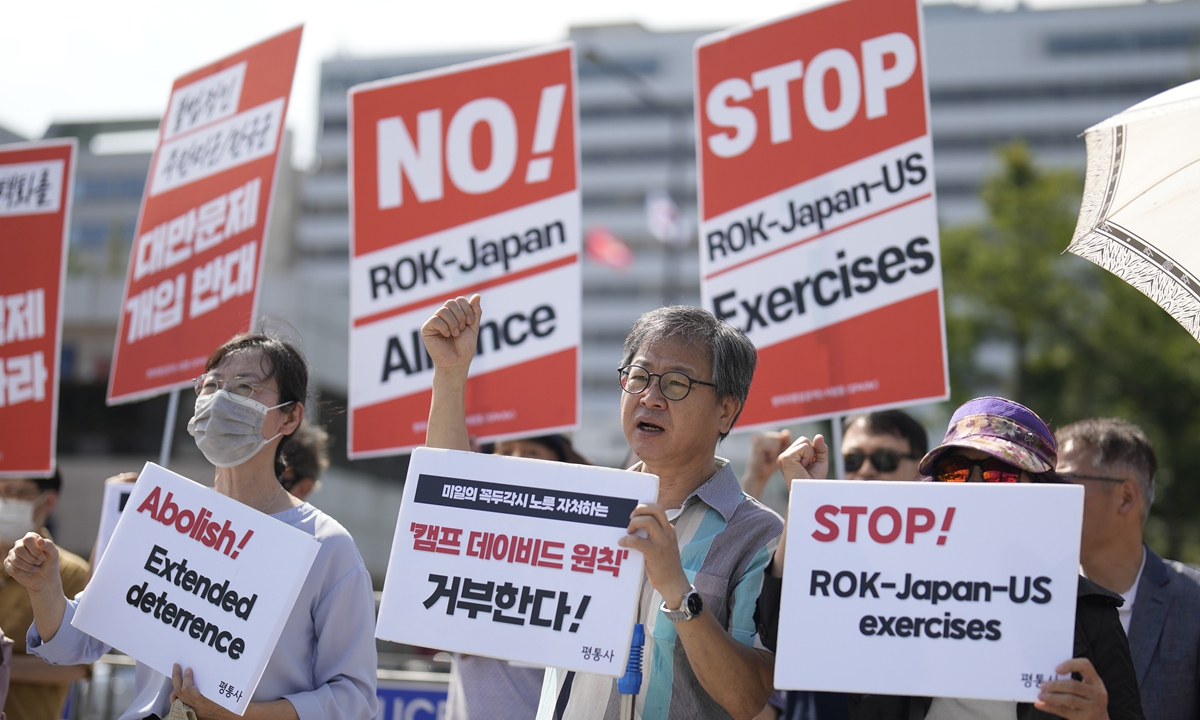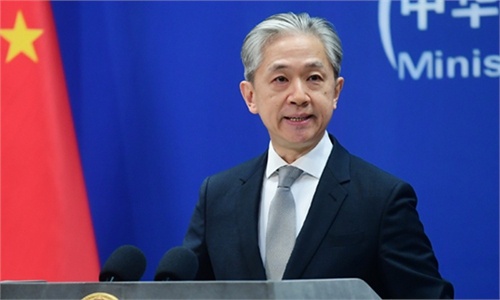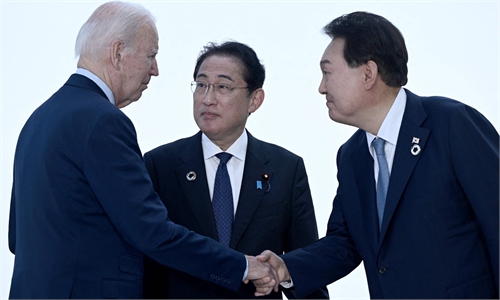US, Japan, S.Korea defense chiefs agree to upgrade ties
Bloc ‘serves great power confrontation, hegemony’

Protesters shout slogans during a rally in Seoul on August 17, 2023, opposing a US-Japan-South Korea trilateral summit at Camp David in Maryland, US, scheduled for August 18. Photo: VCG
Provocations by the US, Japan and South Korea against North Korea will further exacerbate tensions on the Korean Peninsula, making the situation more volatile and requiring more crisis management measures, Chinese experts warned on Monday, after defense chiefs from US, Japan and South Korea affirmed they would finalize a trilateral multi-year exercise plan by the end of 2023 and agreed to speed up the sharing of real-time data on North Korean missile launches, during a three-way security meeting.Although the three parties focused mainly on the Korean Peninsula, experts said the official release of the security meeting, which mentioned the Russia-Ukraine conflict and the Taiwan Straits, also reflected the US' real purpose of strengthening the alliance structure by intensifying the crisis, thus serving the strategic competition of great powers against China and Russia under the US' so-called Indo-Pacific Strategy.
The session also came on the occasion of US Secretary of Defense Lloyd Austin's visit to Seoul for security talks with his South Korean counterpart Shin Won-sik. The two officials, according to the Yonhap News Agency, updated their joint deterrence strategies on North Korea, with Austin reaffirming the US' "extended deterrence" commitment to use the full range of its military capabilities, including nuclear, to defend South Korea.
During the meeting on Sunday between the US and South Korean defense chiefs, with Japanese Defense Minister Minoru Kihara joining via video link, US, South Korea and Japan agreed to launch a real-time missile warning data sharing system in December to better detect and assess North Korea's ballistic missile launches, according to Yonhap.
The defense chiefs also called for the accelerated development of a multi-year trilateral exercise plan, which is scheduled to be finalized by the end of 2023. They also agreed to expand trilateral training into various areas.
During his meeting with Austin on Monday, South Korean President Yoon Suk-yeol called for a vigilant South Korea-US combined defense posture capable of promptly and decisively retaliating against any provocations from North Korea, according to a Yonhap report.
The defense chiefs meeting was viewed as a follow-up to the trio's Camp David summit in August. It also came less than a week after US Secretary of State Antony Blinken's visit to Tokyo and Seoul, during which he stressed the US commitment to allies and slammed the "provocations" from North Korea.
Lü Chao, director of the Institute of US and East Asian Studies under Liaoning University, told the Global Times on Monday that after the Camp David summit, the US, Japan and South Korea formed a quasi-alliance military relationship, and increased military exercises conducted near the Korean Peninsula to further deter North Korea.
In October, the US, Japan and South Korea jointly conducted their first aerial drills and a maritime interdiction exercise near the Korean Peninsula, the first such drill in seven years.
"In the past, it was the US, Japan or the US and South Korea that conducted military exercises, but now the three are colluding together, which indicates that the provocations against North Korea are upgrading," said Lü, "The nuclear deterrence against Pyongyang will worsen the tension on the Korean Peninsula."
The upgraded US-Japan-South Korea military ties will only make the peninsula situation more volatile and divided, with risks escalating, which means that managing crises on the Korean Peninsula in the coming year will be a litmus test of the wisdom of the leaders of all parties, Li Haidong, a professor at the China Foreign Affairs University, told the Global Times on Sunday.
Besides the Korean Peninsula issue, according to the US Department of Defense release, the three defense chiefs also "reaffirmed their commitment to stand with Ukraine against Russia's unprovoked and brutal war of aggression," and emphasized the importance of peace and stability across the Taiwan Straits.
The alliance's function and scope go beyond the Korean Peninsula, which reflects Washington's real strategic intention, Li said.
The change from keeping bilateral ties to forging a trilateral bloc is a substantial step in reshaping US hegemony in the Asia-Pacific region, with alliances designed to serve great power confrontation and to establish hegemony, Li said, "and the great powers in terms of the Asia-Pacific region are undoubtedly China and Russia."
The consolidation of the US-led alliance cannot be achieved without creating crises, and the bloc's latest move against North Korea is aimed at reinforcing the alliance structure and the US dominance therein by intensifying the existing crisis and creating more trouble, Li said.
Although the White House talks about "controlling competition and avoiding conflict," the US' "Indo-Pacific Strategy" is moving in the direction of a fiercer great power confrontation, Li said.
It does reflect the problem of being "unable to make plans without an enemy" in US strategic thinking, Li noted.




